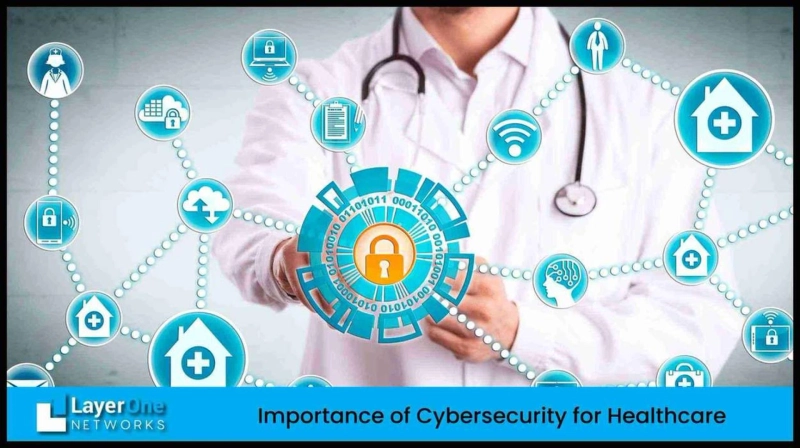In the digital age, the healthcare industry has had to respond to the ever-changing technological landscape. So, cybersecurity in the U.S. is important for healthcare providers who must protect patient data and health information (PHI) from unauthorized access and misuse. With the increasing cyberattacks, healthcare organizations must protect themselves and their patients.
That's where security services in Corpus Christi come into play. Cybersecurity specialists can help organizations develop and implement the best practices for protecting their data, systems, and networks from cybercriminals. They ensure a secure and trustworthy healthcare environment.
So let's examine why cybersecurity is essential for healthcare organizations.
Connected Devices
The number of connected devices in the healthcare sector continues to grow —and they're being used to improve patient care. From smart watches to internet-enabled medical devices, the healthcare industry has embraced the Internet of Things (IoT). This makes it essential for organizations to protect their connected devices from cyberattacks.
Although these devices are becoming more ubiquitous, that also means they're at a greater risk of being hacked. For example, suppose the hackers get into the system. In that case, they could access and manipulate PHI or even steal it. Data security services specialists understand the risk and help organizations protect their connected devices.
What Puts Healthcare at Risk
Healthcare organizations are an attractive target for hackers due to the large amounts of personal and sensitive information. Data appealing to cyber criminals include a patient's social security number, credit card information, and medical history.
If patients' private or sensitive information is stolen, the potential cost is only one issue.
Healthcare organizations spend almost three times more money fixing breaches. It's a fact that providers can't function without access to critical care and other medical records, which is why cybersecurity is so important for the healthcare industry.
Compliance's Effects on Healthcare
The Health Insurance Portability and Accountability Act (HIPAA) is a U.S. federal need that safeguards medical records.
Privacy and Security Rules are essential to keeping private health information confidential. They establish what information can be revealed, how it can be used, and the security protocols to protect data. Therefore, all entities involved in the process must consider these regulations.
There are four tiers of violation for failing to be HIPPA-compliant, the penalties for which vary depending on the severity:
Tier 1: A covered entity can be unaware of a violation if it takes reasonable care to follow HIPAA rules.Tier 2: A covered entity knew of a violation but didn't take reasonable care or knowingly violated the rules.Tier 3: A HIPAA violation occurs due to ignoring the rules, where an effort has been made to fix it.Tier 4: A HIPAA Rules violation committed with willful disregard, where no action has been taken to rectify the issue.Who Does Cyber Security Help Protect?
Good cyber security by reputed managed IT services is important to everyone who comes into contact with the healthcare system in any way because it helps protect against attacks and keep information safe.
It's important to consider each group's perspective before making a final decision. Each of these groups has different care expectations that must be met and communicated to ensure the best security practices are used.
Patients
This group, more than any other, is interested in cyber healthcare security. Cybercriminals can leak data and use personal information to break into private accounts. And also ordering medications through stolen credit cards.
By utilizing telehealth, e-visits, and e-pay systems, healthcare providers can help increase patient safety. This encourages patient engagement, builds trust, and strengthens patient and provider relationships.
Healthcare Providers
Everyone in the healthcare industry must do their part to improve cyber security. They notice when something is wrong before anyone else does. Thus, they must be trained to identify suspicious activity, know what to do when they spot it, and are up-to-date on the latest security threats.
Make sure your healthcare organizations take the necessary steps. Invest in the necessary cyber security tools and train staff to help protect your organization from growing cyber threats. Fostering a culture that says, "we value our patient's data and privacy," is a great way to ensure you take the necessary steps.
Vendors
Healthcare organizations often rely on hundreds or thousands of vendors to function. It can include cloud providers, cleaning crews, third-party software vendors, and more. Therefore, it's important to be aware of these vendors' security risks as they can provide potential access to patient data and other sensitive information.
The FDA is Concerned About Hackers Infiltrating Medical Devices and Weakening their Defenses
The agency has a Cybersecurity Working Group and a Medical Device Cybersecurity Task Force that coordinates with other government agencies to resolve cybersecurity issues.
Furthermore, healthcare organizations must implement best practices into their cybersecurity programs to securely maintain their devices.
AI is Changing the Nature of Cyber-Attacks
AI-powered cyber-attacks are the newest type of technological warfare. They include malware and ransomware that are more sophisticated than before. Phishing attacks that are difficult to detect, and denial-of-service attacks.
AI is transforming how malware works by teaching it to be more sophisticated and difficult to detect. Most security software programs work by identifying specific patterns in the code of an attack. It allows them to recognize it as being malicious. Even so, AI can generate code that appears random but will evade detection. Traditional ways cannot prevent these dangers from breaching your defenses.
With AI, hackers can target specific individuals rather than casting a wide net online. They might be able to create a piece of malware tailored to you. AI also allows cybercriminals to be more efficient by automating processes, allowing them to launch many attacks.
Healthcare organizations must stay on top of the latest cybersecurity threats and update their systems. With the help of an IT consulting firm, security teams can devise appropriate strategies to protect against cyber-attacks.
The Most Popular Healthcare Cyber Threats
As our technology improves and we rely on it more, the chances of a cyber attack also increase.
The most specific intent behind an attack is to get private information to sell or use for personal gain. Though attackers vary, the methods of their attacks can be anything from data destruction to industrial espionage.
Here are the most costly cyber security threats in healthcare, both revenue and reputation-wise:
Ransomware
Ransomware is malware that encrypts your files and data, making them inaccessible. The attacker will then demand ransom to decrypt the information. Services that provide patient care are especially weak to this type of attack because they highly utilize technology and their daily operations are crucial.
Cybercriminals often target health records because they can be sold for a high price on the black market. Unfortunately, even if the ransom is paid, there's no guarantee that the stolen information will be returned.
Phishing Attacks
Phishing attacks involve sending emails that appear to be from legitimate sources but contain malicious links. Attackers often target healthcare organizations because of the large amounts of sensitive data they hold.
Once a user clicks on a link in the email, their machine can become infected with malware or ransomware. In some cases, attackers can even gain access to the healthcare organization's network.
Therefore, both users and organizations need to be aware of phishing attacks and take steps to prevent them.
Cloud Storage Threats
Many healthcare providers have started using cloud-based storage solutions because they're more practical and always connected. While many cloud-based solutions aren't HIPPA compliant, they're still easy targets for intruders. Potential dangers include poor access management, data breaches, leaks, loss of confidential information, and incorrect cloud storage configuration.
To prevent these, healthcare organizations should use encryption and authentication protocols, create data retention policies, and ensure that the cloud provider meets all HIPPA requirements.
AI-driven cyber threats are ever-evolving, so healthcare providers must stay aware of the latest risks and take measures to protect against them. By investing in quality software and consulting an IT security firm, healthcare organizations can ensure that their data is secure.
The Problem of Cybercrime is Getting Worse Every Day
Cybercrime is a growing issue that affects businesses and individuals around the world. Cybercrime has become increasingly sophisticated in recent years and is now one of the most significant threats to our nation's security.
Healthcare organizations are particularly vulnerable to cybercrime as they contain massive amounts of sensitive personal information. As the Internet becomes more prevalent, healthcare organizations must take extra steps to protect themselves from malicious cyber activity. This information, used to commit identity theft or fraud against healthcare consumers, can devastate their finances and reputations. So, healthcare providers need to take proactive steps to protect against cyber attacks.
Healthcare Facilities Need To Prioritize Cybersecurity
You want to provide your patients with the finest care, but safety is always a top priority. This means investing in advanced technology and procedures to protect from cyber-attacks.
A key detail to remember is that cybersecurity involves more than computer systems—people are a part of it, too. All employees must know how to identify suspicious emails or phone calls and understand how to keep information safe.
Final Verdict
Cybercrime is an ever-evolving problem that healthcare organizations need to take. With the security service in Corpus Christi, healthcare organizations can protect their data. They ensure that their systems are up-to-date and compliant with the latest security protocols. So, healthcare organizations can focus on providing their patients with the best care possible without worrying about cyber threats.



